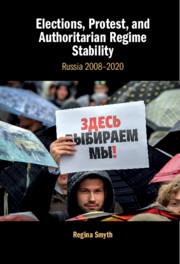Book contents
- Elections, Protest, and Authoritarian Regime Stability
- Elections, Protest, and Authoritarian Regime Stability
- Copyright page
- Dedication
- Contents
- Figures and Tables
- Acknowledgments
- 1 Elections, Protest, and Regime Dynamics
- 2 Winning Elections
- 3 The Long Game
- 4 The Unexpected Power of Weak Opposition
- 5 The Vote Protest
- 6 The Polls Close and Two Movements Emerge
- 7 Protest and Rally Dynamics
- 8 The Perpetual Campaign
- 9 2018–2020
- Book part
- References
- Index
3 - The Long Game
Inter-election Efforts to Shape Electoral Victories
Published online by Cambridge University Press: 16 October 2020
- Elections, Protest, and Authoritarian Regime Stability
- Elections, Protest, and Authoritarian Regime Stability
- Copyright page
- Dedication
- Contents
- Figures and Tables
- Acknowledgments
- 1 Elections, Protest, and Regime Dynamics
- 2 Winning Elections
- 3 The Long Game
- 4 The Unexpected Power of Weak Opposition
- 5 The Vote Protest
- 6 The Polls Close and Two Movements Emerge
- 7 Protest and Rally Dynamics
- 8 The Perpetual Campaign
- 9 2018–2020
- Book part
- References
- Index
Summary
Chapter 3 begins with a cross-national statistical test of the implication of the formal model. Designed to show the external validity of the model, the analysis explores the effect of different opposition and regime strategies on the likelihood of post-election protest. To illustrate that the information value of these signals varies according to the nature of the information environment, I analyze the outcomes in two types of non-democracy electoral regimes: electoral autocracies and closed autocracies. The results show that regime and opposition strategies do influence the potential for protest and that these effects vary according to the context in which elections are held. Given this finding, the second half of the book focuses on regime efforts to change that environment in the inter-election period, highlighting the propensity to manipulate the factors that alter popular perceptions about the regime its opposition, and the nature of state–society relations.
- Type
- Chapter
- Information
- Elections, Protest, and Authoritarian Regime StabilityRussia 2008–2020, pp. 51 - 75Publisher: Cambridge University PressPrint publication year: 2020

